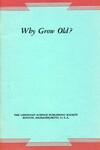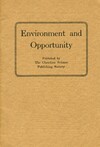

Are you sure?
This bookmark will be removed from all folders and any saved notes will be permanently removed.
WHY GROW OLD?
The ancient Italian city of Ravenna, situated some miles from the Adriatic sea, was protected from invasion by a long stretch of shallow water, through which a channel was marked by posts projecting above the surface. When an enemy threatened from the sea, these posts were pulled out, and the city was thus saved from its foes, who could find no safe channel for approach.
Along the course of the human experiences of all of us are set the mile-posts of events and anniversaries whose recurrence marks the flight of time. These posts are not planted by time, but set by ourselves, ignorant or heedless of the fact that we are thus marking an open channel for the enemy we call age-limitation to enter from the sea of human beliefs. The passing of time is a mortal belief which lies wholly outside the realm of infinite Mind, wherein one day is as a thousand years. The trend of habit and custom is to admit and expect certain changes in physique and mentality with the passing of years. Up to a certain or uncertain point these changes are declared to be for the betterment of the individual, bringing strength and development of body and mind; but after maturity is reached, this laudable belief gradually gives way to the baneful one of deterioration and impairment.
The Christian Scientist can find no warrant in his religion for granting legitimacy or credence to any such beliefs. He knows that man, made in God's image and likeness, has no part in either accretion or decadence; that he has always stood at the point of perfection, and will always there remain. He knows that man, having all good, lacks nothing, and his heritage of good being eternal, he can never be deprived of any part of it, either by age or any other invention of the adversary. Man, in Christian Science, need therefore have no apprehension over advancing years, for while they should bring to him wisdom, they can take from him nothing that he would not voluntarily relinquish. But, because of the heedlessness or indifference of mortals to man's real relationship with God, they are continually driving new posts to mark the line of ingress for the enemy. They tick off each recurring birthday with more and more solemnity, and might often catch themselves looking backward and comparing what they think they cannot do now with what they once could do so well, and in other ways implanting marks of age where none belong.
Enjoy 1 free Sentinel article or audio program each month, including content from 1898 to today.
JSH Collections
This article is included in:
1957 - PAMPHLET
Why grow old?
This article is included in:
1912 - PAMPHLET
Environment and opportunity
JSH-Online has hundreds of pamphlets, anthologies, and special editions for you to discover.

April 8, 1911 issue
View Issue-
WHY GROW OLD?
W. R. RATHVON.
-
"THIS ONE THING I DO."
FRANCES MACK MANN.
-
A ROBIN'S SONG
GEORGIA E. MILLER.
-
THE LOOM OF LIFE
ORA S. DREWRY.
-
FINDING A HOME
M. FLORENCE EUSTIS
-
WATCHFULNESS
MARY THORN.
-
PEACE AND GOOD WILL
JENNIE W. BACON.
-
"SILOAM."
KATHARINE T. PORTER.
-
I returned from a tour in Canada and the States on...
Col. G. Napier
-
In the extract from an article on "Witchcraft" there...
William J. Bonnin
-
In Christian Science practice there is no compounding...
James D. Sherwood
-
May I point out that if a sick man desires to be attended...
Frederick Dixon
-
LIVING THE TRUTH
Archibald McLellan
-
THE PROSPERITY OF ZION
Annie M. Knott
-
"SHAKE THYSELF FROM THE DUST."
John B. Willis
-
THE LECTURES
with contributions from W. H. Harwood , Henry H. Gutterson, A. L. Van Antwerp, Harvey M. Ferris
-
ADMISSION TO MEMBERSHIP IN THE MOTHER CHURCH
John V. Dittemore
-
The psalmist has said, "Oh, that men would praise the...
Edith A. Burton
-
Shortly after the earthquake in San Francisco, my boy,...
Georgeine E. Burgess
-
As I look forward eagerly from week to week for the...
Anna M. Poyntz
-
Some twelve years ago, after suffering much pain and...
Chas. B. Lewis
-
No words can be found to express my gratitude to God,...
Johanna Castendyk
-
I wish to express my gratitude for what Christian Science...
Mary Osborn with contributions from Nettie L. Beal
-
I wish to express my gratitude for many benefits received...
Grace S. Bailey
-
A LESSON FROM A FLOWER
MABEL DOBYNS WEIL
-
FROM OUR EXCHANGES
with contributions from Adolph Roeder, Charles Clark Pierce



